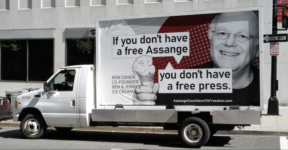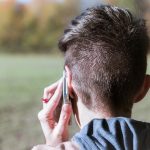Ben & Jerry’s Founder Arrested for Protesting the Prosecution of Julian Assange

The founder of ice cream company Ben & Jerry’s has been arrested for protesting against the continuing prosecution of Julian Assange by the United States Government.
On 6 July 2023, Ben Cohen was leading a small group of protesters, along with co-founder of CODEPINK, Jodie Evans, outside the Department of Justice building in Washington, D.C.
After a formal speech and setting a banner alight, Mr Cohen approached security guards at the Department of Justice and asked to be allowed inside the building to discuss what he described as the “criminalisation” of Mr Assange, and the attack on press freedom.
Security guards denied him access, so he proceeded to sit peacefully in the entrance. Police issued three warnings to Mr Cohen before arresting both him and Ms Evans for “blocking the entrance to a Federal Building”.
The arrest was as peaceful as the “sit in protest” and the pair were held for a few hours before being released by Police.
They have been charged with “unlawful entry” and are due to appear in court via videolink later in July.
It’s not entirely clear at this point the exact nature of the charges, but there are a number of laws in the United States which relate to ‘restricted building or grounds.
The possible charges against Ben Cohen
One of these offences is contained in 18. § 1752 of the U.S. code, which is titled Restricted building or grounds, and provides as follows:
(a) Whoever—
- knowingly enters or remains in any restricted building or grounds without lawful authority to do so;
- knowingly, and with intent to impede or disrupt the orderly conduct of Government business or official functions, engages in disorderly or disruptive conduct in, or within such proximity to, any restricted building or grounds when, or so that, such conduct, in fact, impedes or disrupts the orderly conduct of Government business or official functions;
- knowingly, and with the intent to impede or disrupt the orderly conduct of Government business or official functions, obstructs or impedes ingress or egress to or from any restricted building or grounds; or
- knowingly engages in any act of physical violence against any person or property in any restricted building or grounds;
- knowingly and willfully operates an unmanned aircraft system with the intent to knowingly and willfully direct or otherwise cause such unmanned aircraft system to enter or operate within or above a restricted building or grounds;
or attempts or conspires to do so, shall be punished as provided in subsection (b).
(b) The punishment for a violation of subsection (a) is—
- a fine under this title or imprisonment for not more than 10 years, or both, if—
- the person, during and in relation to the offense, uses or carries a deadly or dangerous weapon or firearm; or
- the offense results in significant bodily injury as defined by section 2118(e)(3); and
(2) a fine under this title or imprisonment for not more than one year, or both, in any other
Case.
(c)In this section—
(1) the term “restricted buildings or grounds” means any posted, cordoned off, or otherwise restricted area—
- of the White House or its grounds, or the Vice President’s official residence or its grounds;
- of a building or grounds where the President or other person protected by the Secret Service is or will be temporarily visiting; or
- (C) of a building or grounds so restricted in conjunction with an event designated as a special event of national significance; and
(2) the term “other person protected by the Secret Service” means any person whom the United States Secret Service is authorized to protect under section 3056 of this title or by Presidential memorandum, when such person has not declined such protection.
Assange ‘tortured’ for telling the truth
Mr Cohen, who founded his ice cream company on social values and has been a long-time activist for various issues of social justice, is protesting US government’s prosecution of Wikileaks publisher Julian Assange, who has been indicted on 18 charges for the publication of the Afghan War Diary and the Iraq War Logs, which uncovered war crimes, torture, and civilian deaths perpetrated by the US government.
“It’s outrageous, says Mr Cohen, “Julian Assange is nonviolent. He is presumed innocent. And yet somehow or other, he has been imprisoned in solitary confinement for four years. That is torture….”
Julian Assange was arrested and carried out of the embassy in London in April 2019 after Ecuador revoked his political asylum.
He was sentenced on 1 May 2019 to 50 weeks in prison by a British court for skipping bail and completed that sentence, but remains behind bars pending extradition hearings.
But way back in 2016, a United Nations Working Group on Arbitrary Detention (WGAD) determined that Mr Assange had been arbitrarily detained by the Governments of Sweden and the United Kingdom of Great Britain and Northern Ireland.
In the group’s view, the Working Group recognized that Mr. Assange is entitled to his freedom of movement and to compensation.
The WGAD conclusions were sent to each of these governments, yet still nothing has been done to set Assange free, or at least allow him his freedom until the courts determine his fate.
And while there is mounting pressure on the US Department of Justice – members of the Congress, world leaders, as well as major publishers and a number of Australian MPs have all called in recent months for charges to be dropped, the Australian Government also has some responsibility.
Assange, is after all, an Australian citizen. Both Prime Minister Anthony Albanese and the opposition leader, Peter Dutton, agree that he has been incarcerated for too long, with the nation’s leader publicly stating “enough is enough” but seemingly doing very little to actively campaign for his release, presumably over fears of upsetting the United States.
In fact, a Senate probe found last year that, despite his public statements both before and after being elected to the nation’s top job, Mr Albanese is not taking action to campaign for Assange’s release.
Attack on Press Freedom
The major argument in the United States against Assange’s prosecution is the threat it poses to the First Amendment, which protects freedom of speech, freedom of the press, freedom of assembly, and the right to petition the Government for a redress of grievances.
A decade ago, when Barack Obama was the US President, the Washington Post reported that the Obama administration had all but concluded it would not pursue Julian Assange because it could not do so without subsequently also pursuing media outlets that published WikiLeaks cables, including The New York Times, the Post and Britain’s Guardian newspaper.
Obama did nothing to advance the prosecution of Julian Assange, however under the Trump administration, the case against Julian Assange progressed – there have even been reports that the CIA discussed options to assassinate Assange, but these have never been officially confirmed.
In most recent hearings, though, the nature of the US government’s case seems to have changed, with lawyers for the US government repeatedly stressing that the charges laid against Assange only relate to computer hacking.
This may be, perhaps, because current President Biden, who made his support of a free press part of his election campaign, has faced a great deal of criticism for “hypocritically” continuing to seek the extradition of Assange.
Assange lost his latest appeal in a UK court against his extradition, and if sent to the US will be prosecuted, facing up to 175 years in prison.







